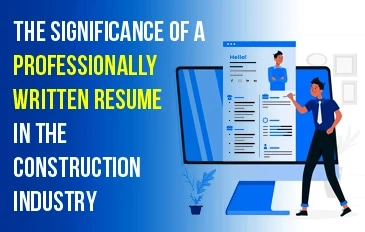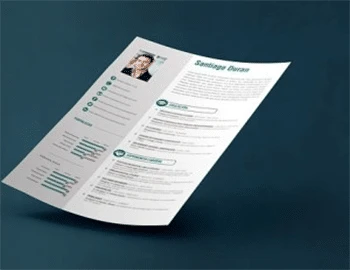The Significance of a Professionally Written Resume in the Construction Industry

The Significance of a Professionally Written Resume in the Construction Industry
In the competitive landscape of the construction industry, a professionally written resume can make a significant difference in landing your dream job. A resume serves as your first impression to potential employers, highlighting your skills, experience, and qualifications. To stand out among a sea of applicants, it’s crucial to present a polished and well-crafted resume that captures the attention of hiring managers.
This article explores the importance of having a professionally written resume in the construction industry and how it can enhance your chances of securing employment opportunities.
- Showcasing Relevant Experience and Skills: A professionally written resume enables you to effectively showcase your relevant experience and skills specific to the construction industry. Professional resume writers have a deep understanding of the industry’s requirements and can tailor your resume to highlight your achievements, certifications, licenses, and technical expertise. They know which industry-specific keywords and terminologies to incorporate to capture the attention of hiring managers and applicant tracking systems (ATS). By focusing on your construction-related accomplishments and qualifications, a professionally written resume ensures that your key strengths are emphasized, increasing your chances of being shortlisted for an interview.
- Presenting a Clear and Organized Format: A professionally written resume ensures that your information is presented in a clear and organized format, making it easy for recruiters and hiring managers to navigate. Resume writers understand the importance of visual appeal and readability. They utilize appropriate headings, bullet points, and formatting techniques to create a well-structured document that is visually appealing and enhances readability. A clutter-free and professionally formatted resume helps recruiters quickly find the information they need, ensuring your qualifications and experiences are easily understood and appreciated.
- Overcoming Employment Gaps and Career Transitions: If you have employment gaps or are transitioning to a construction role from another industry, a professionally written resume can effectively address these concerns. Professional resume writers know how to strategically present your experience and skills to bridge employment gaps or highlight transferable skills. They can focus on relevant training, certifications, or volunteer work that demonstrates your commitment to professional development or industry involvement. By minimizing the impact of employment gaps and emphasizing your relevant abilities, a professionally written resume boosts your chances of being considered for construction opportunities.
- Optimizing for Applicant Tracking Systems: Many employers in the construction industry utilize applicant tracking systems (ATS) to streamline their hiring processes. These systems scan resumes for specific keywords and qualifications before human eyes review them. Professional resume writers are familiar with ATS requirements and can optimize your resume to ensure it gets past this initial screening. They incorporate relevant keywords and industry-specific terminology, ensuring that your resume ranks high in ATS algorithms and reaches the hands of hiring managers. This optimization increases your visibility and the likelihood of securing an interview.
- Enhancing Professional Branding: A professionally written resume goes beyond listing your work history and qualifications; it helps build your professional brand. Resume writers know how to craft a compelling summary or objective statement that succinctly communicates your value proposition to potential employers. They highlight your unique strengths, accomplishments, and contributions, allowing you to differentiate yourself from other candidates. By presenting your brand consistently throughout the resume, from the design elements to the language used, a professionally written resume leaves a lasting impression and positions you as a strong candidate in the construction industry.
- Saving Time and Maximizing Opportunities: Writing a resume from scratch can be time-consuming and challenging, especially if you are not familiar with industry expectations or current resume trends. Engaging a professional resume writer saves you time and ensures that your resume is tailored to the specific requirements of the construction industry.
Michael DeSafey is a leading executive recruiter for professionals in the construction, engineering, and environmental industries. He is currently the President of Webuild Staffing: www.webuildstaffing.com. To learn more about Michael, or to follow his blog, please visit www.michaeldesafey.com.
Category: Construction, Interview And Job Search Tips, Jobs, Resume Writing
Enhancing Your Job Search with Resume SEO: Increase Visibility and Land Your Dream

Enhancing Your Job Search with Resume SEO: Increase Visibility and Land Your Dream
In today’s competitive job market, it’s crucial to go beyond traditional resume writing techniques to stand out. By implementing Search Engine Optimization (SEO) strategies, you can optimize your resume for online visibility and increase your chances of landing your dream job.
In this blog post, we will explore effective techniques for using SEO to enhance the visibility of your resume. From keyword optimization to formatting and leveraging online platforms, we will provide actionable tips to help you rise above the competition and capture the attention of employers and recruiters.
- Research Relevant Keywords: Start by researching and identifying keywords that are relevant to your target industry or job role. Consider the specific skills, qualifications, and job titles commonly sought after by employers. Tools like Google Keyword Planner, industry-specific keyword research tools, and job postings can help you discover the most relevant keywords. Incorporate these keywords strategically throughout your resume, focusing on the headline, summary, skills section, and job descriptions. This will improve the chances of your resume appearing in search results when recruiters and hiring managers are looking for candidates with specific qualifications.
- Craft a Keyword-Optimized Headline: Your resume’s headline is the first thing employers and recruiters will see in search results. Craft a compelling headline that accurately represents your professional identity and includes relevant keywords. Instead of using a generic title like “Experienced Project Manager,” consider a more targeted and keyword-rich headline such as “Results-Driven Project Manager with Expertise in Construction and Budget Management.” This will increase the visibility of your resume and ensure it stands out in search results.
- Optimize Resume Formatting and Structure: In addition to keywords, search engines analyze the structure and formatting of your resume. Optimize your resume’s format to improve its SEO. Use clear headings and subheadings to organize content and make it easier to read. Incorporate bullet points to highlight key achievements, skills, and responsibilities. Avoid complex file formats that may hinder search engine crawling. Additionally, optimize your resume for mobile devices, as recruiters often review resumes on smartphones or tablets.
- Leverage Online Platforms and Job Boards: Maximize the visibility of your resume by utilizing online platforms and job boards. Upload your resume to reputable job boards and career websites, ensuring it’s easily searchable by employers and recruiters. Optimize your profile on professional networking sites like LinkedIn by incorporating relevant keywords, completing all sections, and regularly updating your profile. Join industry-specific groups and engage in relevant discussions to enhance your online presence and increase the likelihood of being discovered by potential employers.
- Create a Personal Website or Portfolio: Consider creating a personal website or portfolio to showcase your resume, work samples, and accomplishments. This provides an additional online platform to optimize for SEO. Optimize your website by incorporating relevant keywords throughout the content, including your resume section. Ensure your website is user-friendly, easily navigable, and optimized for search engines. By creating a personal brand and directing traffic to your website, you can enhance your visibility and make a memorable impression on potential employers.
- Build High-Quality Backlinks: Backlinks, or incoming links from other websites to your resume, can significantly improve its visibility. Share your resume on professional blogs, industry forums, or websites related to your field. Contribute guest articles or publications to reputable websites and include a link to your resume in your author bio. This not only increases exposure but also establishes your expertise and credibility in the industry. Additionally, reach out to relevant websites or blogs and inquire about guest posting opportunities to further expand your online presence.
- Regularly Monitor and Update: Continuously monitoring and analyzing the performance of your resume on job boards, personal website, etc. will aide greatly in ensuring maximum effectiveness.
Michael DeSafey is a leading executive recruiter for professionals in the construction, engineering, and environmental industries. He is currently the President of Webuild Staffing: www.webuildstaffing.com. To learn more about Michael, or to follow his blog, please visit www.michaeldesafey.com.
What to Include on Your Resume When Working in the Construction, Engineering and Environmental Industries

What to Include on Your Resume When Working in the Construction, Engineering and Environmental Industries
Oftentimes, the hardest part of a job search is not the application, or even the interview, but knowing what to put on the resume when you are working in the construction, engineering or environmental industries.
Resumes, however remain the cornerstone of your job search, especially if you work in construction, engineering, or environmental fields. They allow your potential future employer to see a glimpse of your life’s work, your skills, project you have worked on and achievements, and even something of your personality.
In highly specialized or skilled fields, a resume can set you apart from all of the highly qualified and trained individuals competing for the same position.
Here are some things you may want to consider.
Keywords
In the age of the search engine and algorithm, employers are relying more frequently on their computers to weed out undesirable candidates based on keywords used (or not used). When writing the whole of your resume, keep your past experience and current occupation goals in mind in order to include as many keywords as possible. The Balance Careers has compiled potential lists for construction specialists, to review, several engineering specializations (including mechanical engineering and environmental professionals ) while not exhaustive, these lists might get you started.
Job Title
Ask for what you want! With your name and contact information at the top of your resume, it can also be a good idea to list the position or title you desire; if you are applying for several different positions that do not carry the same title, taking the extra time to modify your resume and customize it for each application can highlight you as a candidate. Make sure, however, that your resume demonstrates that you can truly do the work required of the position you are listing.
Work Experience
This section of your resume will most likely make up the bulk of your resume (if you are newly graduated, it may not, in which case, replace this section with your “Academic History” section). If you have worked many jobs in the past, some of which were not related to your current field (such as a stint at McDonald’s), or if you made a career change, you may want to consider omitting the irrelevant work experience. However, do not be dishonest; if you leave off work experience because you had a poor relationship with the company, it may be revealed with later background checks and cast you in an unfavorable light. It is usually better to over-explain than under-explain.
Skills
The skills section of your resume is a great place to use the keywords you have decided on for your profession. Many people list generic things, such as “proficient in Microsoft Suite,” or “team player,” but for candidates in construction, engineering, and environmental careers, these generic lists will not highlight the specialized skills that individuals in these fields often have. List those useful and specific skills that are going to set you apart from the rest.
Academic Achievements and Contributions
It is important for employers to know that their employees have been thoroughly trained, especially for skilled jobs. Obviously, you should list universities attended (along with cumulative GPA) and training programs completed. Additionally, if you have taught in your field, or done academic research in a specific area (this may be especially applicable to environmental professionals), you may want to include a Curriculum Vitae, or at least list several of your publications to prove your expertise.
A little extra time and care spent on perfecting your resume could mean the difference between a job offer and a polite rejection; it may be a few hours that you do not want to spend, but the results are worth the effort for landing a great job opportunity in the construction, engineering or environmental industries.
Michael DeSafey is a leading executive recruiter for professionals in the construction, engineering and environmental industries. He is currently the President of Webuild Staffing www.webuildstaffing.com . To learn more about Michael or to follow his blog please visit www.michaeldesafey.com
10 Resume Tips for Professionals in the Construction Industry

10 Resume Tips for Professionals in the Construction Industry
Preparing a resume that is organized, succinct, and eye-catching is one of the best ways for construction professionals to launch a fruitful job search. Eye-catching resumes typically feature highly desired skill sets, relevant certifications, and impressive projects that were completed ahead of schedule and within budget. Below are ten simple resume writing tips that everyone in the construction industry should follow.
1) Tailor your resume to the type of position you are seeking. Employers are often searching for candidates with a specific set of skills. Review commonly required skills for the type of position that you are seeking and be sure to include references to your skills in those areas. Examples of specific skills that are frequently sought in the construction industry include:
- Expertise in construction law
- Incorporation of sustainable design strategies
- Equal Employment Opportunity Employment expertise
2) Include the number of people you managed. It is particularly important to mention work experience that involved supervision of multiple teams of people or a large number of workers. Hiring managers recognize that there is usually a big difference between a candidate who has managed a team of 15 laborers and a candidate who has overseen 150 laborers.
3) Highlight relevant certifications. Industry certifications set professionally trained candidates apart from the pack and often instill confidence in recruiters and hiring managers. Examples of key certifications to consider including are as follows:
- Certified Construction Manager (CCM)
- Construction Safety Certification
- OSHA Hazardous Waste Operations & Emergency Response (HAZWOPER)
- Any CPR or First Aid related certifications
4) Highlight three or four of your most notable projects. Be sure to reference the budgets associated with each project to provide hiring executives with an idea of the magnitude of the ventures that you have overseen. You can also showcase your flexibility and breadth of experience by including a diverse collection of projects within the public, commercial, and residential construction arenas.
5) Showcase successful projects that were completed ahead of time or under budget. Continued construction labor shortages are leading to an increase in project delays and overspending. Completing projects ahead of time or under budget is more impressive now than ever, so construction professionals should not be shy about highlighting their ability to exceed client expectations.
6) Reference familiarity with special tools or software. Remaining competitive in the construction industry requires a commitment to learning the latest cutting-edge
- Building Information Modeling (BIM) software
- Computer-Aided Design (CAD) software
- Familiarity with 3D visualization and architectural animation
7) Prepare an impressive portfolio of references. Include people who can provide feedback regarding your skills and aptitudes. Additionally, if a specific skill is required for a position you are actively pursuing, be sure to include references who can discuss your achievements in that area. For instance, if a position requires a candidate with a history of supervising 100+ workers, make sure that the references you include can speak about your ability to oversee multiple teams of workers.
8) Include your LinkedIn URL. A growing number of hiring managers and recruiters are looking at LinkedIn profiles to confirm candidates’ legitimacy and industry connections. Make sure that your profile is up to date and that there are not any consistencies between information on your LinkedIn profile and your resume.
9) Reference any awards or special recognition you have received. Awards that are relevant to the company or position for which you are applying are especially helpful. Examples of relevant awards include the following:
- Associated Builders and Contractors, Inc (ABC) awards for excellence in construction
- Construction Industry Safety Excellence (CISE) awards for safety improvements
- Any local or state awards received for outstanding achievements in the construction industry
10) Seek the input of an expert staffing professional. Enlisting the assistance of a leading executive staffing agency is one of the best ways to ensure that your resume is professional and complete. A dedicated agency representative can also provide assistance with career coaching and other job-related activities. Ideally, the agency you choose should have decades of experience providing guidance to professionals within the construction industry.
The role of a well-organized resume should not be understated. By following the tips above, construction professionals can enhance their chances of grabbing the attention of hiring managers.
Michael DeSafey is a leading executive recruiter for professionals in the construction, engineering and environmental industries. He is currently the President of Webuild Staffing www.webuildstaffing.com . To learn more about Michael or to follow his blog please visit www.michaeldesafey.com
